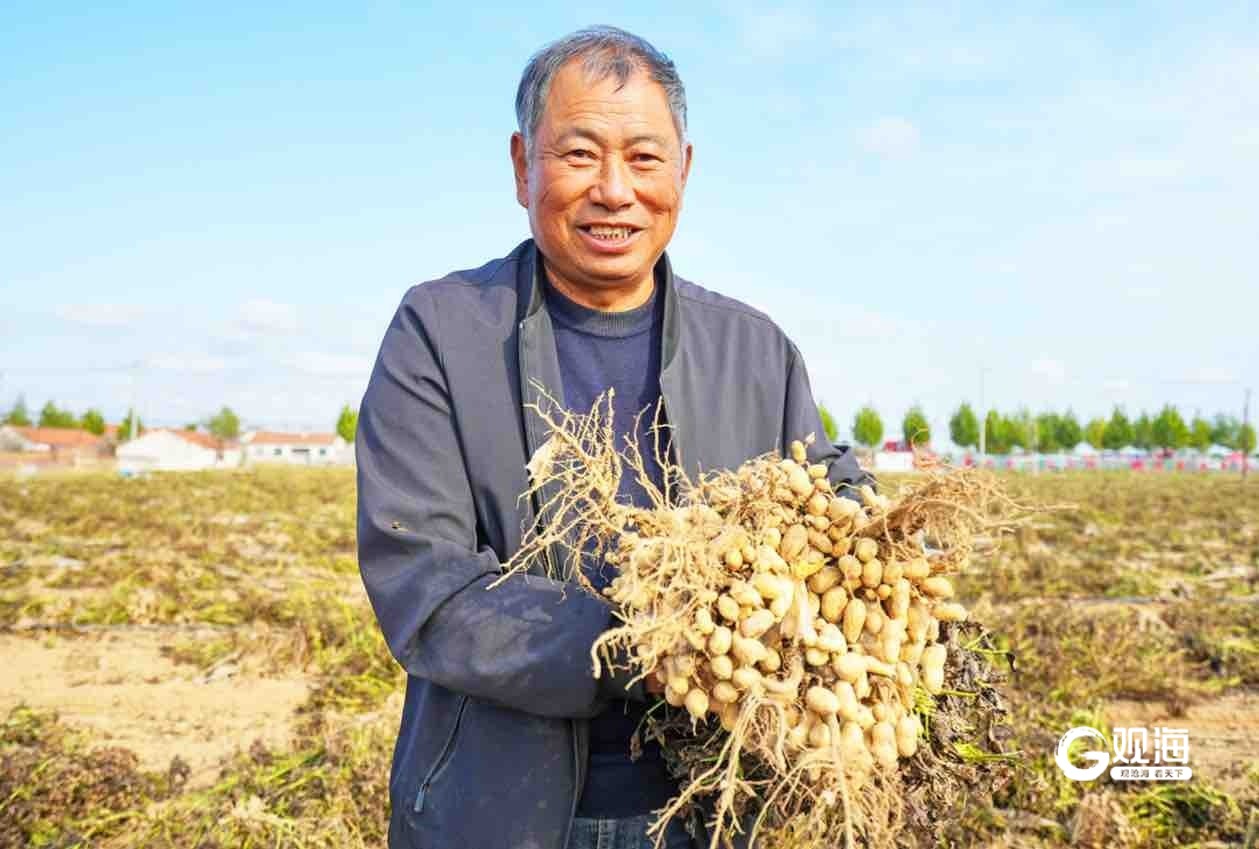
In Dachang Town of Qingdao West Coast New Area, the flat and fertile riverfront land at the confluence of the Baima and Jili rivers is ideal for peanut cultivation. As the local peanut harvest nears its end, mature peanuts, unearthed from the ground, are still covered in moist soil, exuding a fresh, natural aroma. In recent years, local farmers have widely adopted a new variety known as "fruit peanuts," which are highly favored by consumers for their excellent quality, plump kernels, and sweet taste.
"Look at this plant, it has more than twenty peanuts," said Zhang Chongping, a 62-year-old farmer, holding a freshly pulled peanut plant in his hand while speaking to the reporter in the field. He gently cracked open a peanut. "Have a taste! This is the new variety of fruit peanut we're growing." The reporter tried one and found that it lacked the greasy feel of common peanuts, leaving a light, sweet aftertaste. "The regular peanuts we used to grow tasted astringent when eaten fresh, but this variety is completely different," Zhang said. He crouched down and brushed away the soil, revealing the pods embedded in the sandy loam. "This soil is thoroughly irrigated by the waters of the Baima River, locking the nutrients inside the kernels. That's how we can grow such good peanuts."
A ten-minute walk west from the peanut field leads to the lower reaches of the Baima River. In the approximately 120-meter-wide channel, clear water flows gently over a soft sand riverbed. "Our peanuts grow on the alluvial plain where the Baima and Jili rivers meet, drinking the fresh water of the Baima River and rooted in selenium-rich sandy loam," said Tian Changgeng, head of the Dachang Town Agriculture and Rural Affairs Center. "Sandy loam is breathable and retains water well, making it very suitable for peanut growth."
According to official information, Dachang Town has an average annual temperature of 12°C. The combined annual runoff of the Baima and Jili rivers is about 16 million cubic meters, and together with the regulation from four small and medium-sized reservoirs, it forms a stable irrigation network. In the experimental fields of the "Shuiyun Sanhe" (Water Charm of Three Rivers) Rural Revitalization Demonstration Zone, three senior agronomists are guiding farmers to inspect the quality of the peanuts. "The soil here is rich in mineral elements like potassium and calcium, and the large diurnal temperature range allows the peanuts to accumulate more sugars and amino acids, giving them a naturally sweet flavor."
At the Shengkelong Modern Agricultural Planting Base, sprinklers rotate at a steady pace across more than 2,200 acres of high-standard farmland. "We use water from the Baima River for irrigation, apply organic fertilizers throughout the process, and rely on insect-killing lamps and natural predators for pest control," introduced Wang Lei, the head of the base. As a national-level ecological farm, their peanuts are grown without highly toxic pesticides from planting to harvest and have received Green Food certification.
Villager Jiang Yongzhan loaded the last basket of peanuts onto his truck, his face beaming with a smile. "These 'golden beans' are our key to prosperity." From the fertile land at the confluence of two rivers to the citizens' dining tables, the fruit peanuts of Dachang Town are writing a vivid chapter of rural revitalization with their sweet taste. (By Luan Piwei, reporter from Qingdao Evening News / Guanhai News / ZAKER Qingdao. Correspondent: Xu Li)
Editor: Yuan Ruichen




